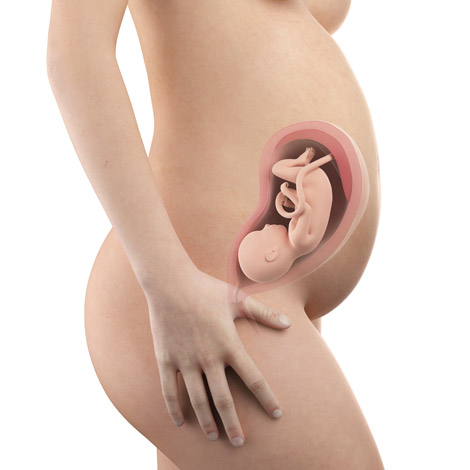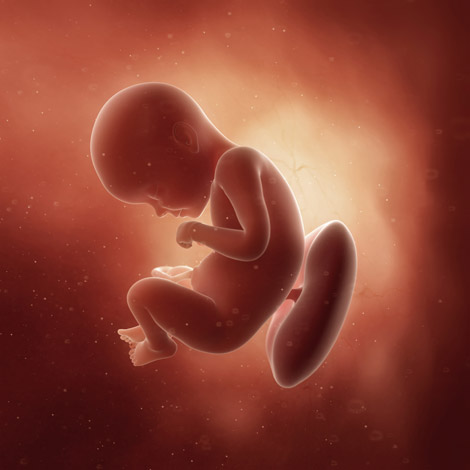Your baby this week
POUNDS IN WEIGHT
Your baby is now close to her birth length.
Her brain is also growing at a fast rate.
Her bones are continuing to harden.
How big is your baby?
In pregnancy week 29, your baby will weigh around 1.1kg (2.4 lb) and she’ll measure about 38.6cm (15.2 in) from top to bottom. She is now roughly the size of a large butternut squash.

How big is your baby?
In pregnancy week 29, your baby will weigh around 1.1kg (2.4 lb) and she’ll measure about 38.6cm (15.2 in) from top to bottom. She is now roughly the size of a large butternut squash.

What does your baby look like?
As she starts to gain more fat, her wrinkled skin will smooth out. To make room for her expanding brain, her skull is growing. Because of this, her forehead may appear to be bulging, but the bone is still really soft and the cranium plates are not yet fully developed. They won’t fuse until after your baby is born.
Changes in your body this week
It is normal to feel very tired because of all the weight you are gaining. Your hormones may also cause dryness and itching of the skin.
You can probably feel your baby kicking at a regular rate now. While this can be exciting, her constant punching and kicking against your uterus may also cause discomfort. Sore ribs are often a result of this constant movement and jabbing, but it is also caused by pressure from your uterus. Try soaking in a deep, warm bath to soothe the pain.
How your baby is developing
Her bones are continuing to harden as 200mg of calcium is deposited in her skeleton every day. It’s important that you help this process by making sure you get enough calcium (try by drinking a glass of milk a day) and other essential vitamins and minerals.
Your baby is now close to her birth length, but she still has a lot of weight to put on. Most of this poundage will accumulate over the next three months.

How your baby is developing
Her bones are continuing to harden as 200mg of calcium is deposited in her skeleton every day. It’s important that you help this process by making sure you get enough calcium (try by drinking a glass of milk a day) and other essential vitamins and minerals.
Your baby is now close to her birth length, but she still has a lot of weight to put on. Most of this poundage will accumulate over the next three months.

She is finally starting to gain the fat deposits required to help her stay warm when she leaves the cosiness of your uterus. Her brain is also growing at a fast rate. It has now developed so that it can regulate her body temperature.
Health concerns
If you are thought to be at risk, then at this point you may be retested for HIV, syphilis, chlamydia, and gonorrhoea so that your status is known for sure before giving birth.
Earlier in your pregnancy, your blood would have been tested to see if you have the Rhesus factor. If the test results show that your red blood cells do not have the rhesus factor (you’ve tested Rh-negative), then there is a possibility your blood is incompatible with your baby’s, and your immune system may produce antibodies to protect you against your baby’s blood. If you are Rh-negative, then you will require an injection of Rh immune globulin to prevent the creation of these antibodies.
Are there any symptoms you should be looking out for?
A pregnancy symptom that is likely to cause you discomfort in the third trimester is carpal tunnel syndrome (CTS). CTS causes pain, numbness, and tingling in your hands and fingers. It’s a common condition in pregnancy, largely due to oedema, which causes swelling in the wrists. The swelling causes pressure on the median nerve, which is the nerve that controls feeling in your hand.
After pregnancy, when the swelling subsides, your CTS should fade as well, but sometimes this is not the case. If you’re experiencing pain or a pins and needles sensation in your fingers (or possibly the whole hand) that is constant or seems to be getting worse, tell your doctor or midwife.
Safety first
Your Braxton Hicks Contractions will have become more noticeable by now. This is your body warming up for labour. You should pay attention to them and recognise what they feel like so it’s easy for you to tell them apart from the actual signs of labour.
Remember, Braxton Hicks contractions are infrequent, unrhythmical, and usually last less than a minute. Labour contractions are more regular, more frequent, and last longer. They are also more painful, although some pain may occasionally accompany Braxton Hicks contractions.
If the Braxton Hicks contractions feel particularly strong when you exercise, then don’t hesitate to stop to take a break or end the exercise session completely.

Important issues this week
With only a few months to go before you give birth, it’s never a bad idea to be prepared, and one of the best ways you can prepare yourself for labour is by attending an antenatal class.
As well as preparing you for birth, the aim of an antenatal class is to teach you how to look after your baby in the initial stages of motherhood.
Antenatal classes typically start for pregnant women at around 30-32 weeks, so look into them now if you haven’t already. If you’re expecting twins, then the classes are likely to start a bit earlier. Topics covered will include keeping healthy in pregnancy, (if you’ve been reading the articles in your My BabyManual newsletter, you’ll already be an expert!) how to help yourself cope with labour, including which relaxation techniques to try, and basic baby care. An antenatal class will also help you make a birth plan.
Your health after the birth will also be addressed, focusing on both your physical and emotional condition.
Not all antenatal classes will focus on the same topics. Speak to you midwife about which class would be best for you.
Keeping fit, staying healthy
If you’re a regular at the gym, you have probably found that some machines, like the rowing machine, are becoming too uncomfortable to use in your third trimester. Even a stationary exercise bike may cause some issues.
If this is the case, you may have to find ways of changing your routine so that it is less dependent on such machines. Maybe you can find a recumbent exercise bike. This allows you to adjust the seat so that you give your tummy more room.
Looking forward; planning ahead
Are any friends or relatives throwing you a baby shower? As baby showers are traditionally something arranged for the expectant mother by friends and family, it’s not up to you to get involved in the planning, so, steer clear of making demands. But you could help out by supplying some gift ideas or a preferred menu – this could be the time to indulge in a few treats.
Baby showers are a great opportunity to have fun and receive some much-needed baby supplies, while also having fun with friends and relatives before the big day. So, don’t hesitate to make a wish list.
On that note, from here on in, you really do need to start making sure you’re well-equipped for when the baby arrives. This means making a checklist of all the baby essentials you’ll need during the first few weeks, such as nappies, wet wipes, changing bag and mat, etc. etc. etc.



